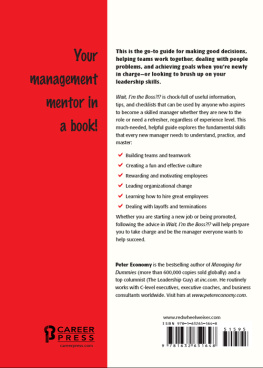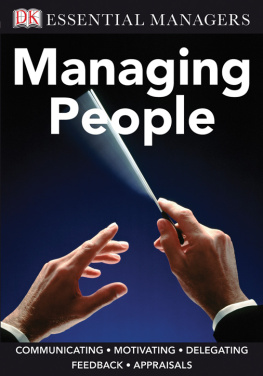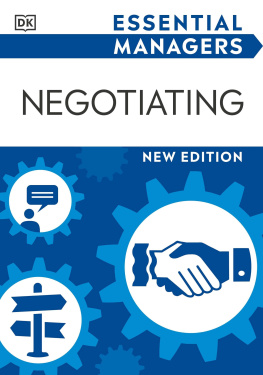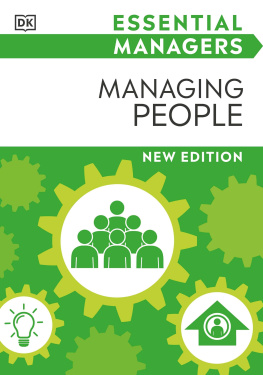Other titles in the Briefcase Books series include:
Customer Relationship Management by Kristin Anderson and Carol Kerr
Communicating Effectively by Lani Arredondo
Performance Management by Robert Bacal
Managers Guide to Performance Reviews by Robert Bacal
Managers Guide to Crisis Management by Jonathan Bernstein
Recognizing and Rewarding Employees by R. Brayton Bowen
Sales Techniques by Bill Brooks
Motivating Employees, Second Edition by Anne Bruce
Building a High Morale Workplace by Anne Bruce
Six Sigma for Managers by Greg Brue
Design for Six Sigma by Greg Brue and Robert G. Launsby
Managers Guide to Marketing, Advertising, and Publicity by Barry Callen
Managers Guide to Planning by Peter J. Capezio
Leadership Skills for Managers by Marlene Caroselli
Negotiating Skills for Managers by Steven P. Cohen
Effective Coaching, Second Edition by Marshall J. Cook and Laura Poole
Managers Guide to Mentoring by Curtis J. Crawford
Conflict Resolution by Daniel Dana
Managers Guide to Strategy by Roger A. Formisano
Project Management, Second Edition by Gary R. Heerkens
Budgeting for Managers by Sid Kemp and Eric Dunbar
Hiring Great People by Kevin C. Klinvex, Matthew S. OConnell, and Christopher P. Klinvex
Managers Guide to Social Media by Scott Klososky
Time Management by Marc Mancini
Managers Guide to Fostering Innovation and Creativity in Teams by Charles Prather
Presentation Skills for Managers by Jennifer Rotondo and Mike Rotondo, Jr.
Finance for Non-Financial Managers by Gene Siciliano
Managers Guide to Business Writing, Second Edition by Suzanne Sparks Fitzgerald
Managers Survival Guide by Morey Stettner
The Managers Guide to Effective Meetings by Barbara J. Streibel
Managing Multiple Projects by Michael Tobis and Irene P. Tobis
Accounting for Managers by William H. Webster
To learn more about titles in the Briefcase Books series go to
www.briefcasebooks.com

Copyright 2014 by McGraw-Hill Education. All rights reserved. Except as permitted under the United States Copyright Act of 1976, no part of this publication may be reproduced or distributed in any form or by any means, or stored in a database or retrieval system, without the prior written permission of the publisher.
ISBN: 978-0-07-182715-7
MHID: 0-07-182715-3
The material in this eBook also appears in the print version of this title: ISBN: 978-0-07-182714-0, MHID: 0-07-182714-5.
eBook conversion by codeMantra
Version 2.0
All trademarks are trademarks of their respective owners. Rather than put a trademark symbol after every occurrence of a trademarked name, we use names in an editorial fashion only, and to the benefit of the trademark owner, with no intention of infringement of the trademark. Where such designations appear in this book, they have been printed with initial caps.
McGraw-Hill Education eBooks are available at special quantity discounts to use as premiums and sales promotions or for use in corporate training programs. To contact a representative please visit the Contact Us page at www.mhprofessional.com.
This is a CWL Publishing Enterprises book developed for McGraw-Hill by CWL Publishing Enterprises, Inc., Madison, Wisconsin, www.cwlpub.com.
Product or brand names used in this book may be trade names or trademarks. Where we believe there may be proprietary claims to such trade names or trademarks, the name has been used with an initial capital or it has been capitalized in the style used by the name claimant. Regardless of the capitalization used, all such names have been used in an editorial manner without any intent to convey endorsement of or other affiliation with the name claimant. Neither the author nor the publisher intends to express any judgment as to the validity or legal status of any such proprietary claims.
TERMS OF USE
This is a copyrighted work and McGraw-Hill Education and its licensors reserve all rights in and to the work. Use of this work is subject to these terms. Except as permitted under the Copyright Act of 1976 and the right to store and retrieve one copy of the work, you may not decompile, disassemble, reverse engineer, reproduce, modify, create derivative works based upon, transmit, distribute, disseminate, sell, publish or sublicense the work or any part of it without McGraw-Hill Educations prior consent. You may use the work for your own noncommercial and personal use; any other use of the work is strictly prohibited. Your right to use the work may be terminated if you fail to comply with these terms.
THE WORK IS PROVIDED AS IS. McGRAW-HILL EDUCATION AND ITS LICENSORS MAKE NO GUARANTEES OR WARRANTIES AS TO THE ACCURACY, ADEQUACY OR COMPLETENESS OF OR RESULTS TO BE OBTAINED FROM USING THE WORK, INCLUDING ANY INFORMATION THAT CAN BE ACCESSED THROUGH THE WORK VIA HYPERLINK OR OTHERWISE, AND EXPRESSLY DISCLAIM ANY WARRANTY, EXPRESS OR IMPLIED, INCLUDING BUT NOT LIMITED TO IMPLIED WARRANTIES OF MERCHANTABILITY OR FITNESS FOR A PARTICULAR PURPOSE. McGraw-Hill Education and its licensors do not warrant or guarantee that the functions contained in the work will meet your requirements or that its operation will be uninterrupted or error free. Neither McGraw-Hill Education nor its licensors shall be liable to you or anyone else for any inaccuracy, error or omission, regardless of cause, in the work or for any damages resulting therefrom. McGraw-Hill Education has no responsibility for the content of any information accessed through the work. Under no circumstances shall McGraw-Hill Education and/or its licensors be liable for any indirect, incidental, special, punitive, consequential or similar damages that result from the use of or inability to use the work, even if any of them has been advised of the possibility of such damages. This limitation of liability shall apply to any claim or cause whatsoever whether such claim or cause arises in contract, tort or otherwise.
Contents
Introduction
Theres an old joke that generations of disgruntled employees like to tell each other.
You know what the definition of manager is, dont you?
No, tell me.
A manager is the person who sees the visitors so that everyone else can get the work done.
Maybe thats funny to worker bees. But now that youre a manager, its your job to laugh with your staff, rather than having them laugh at you.
There are thousands of managers out there, all trying to recruit, train, and motivate their staff. They all want the same thing: to please their bosses, to earn the respect of their employees, and, above all, to avoid the headaches that so often come with people management.
As a new manager, you may find the whole task daunting. In your old job, you could excel by mastering a specialty. You showed up every day, carved out an area of expertise, and thrived by performing at a level that impressed higher-ups at your organization.
Now youve earned a reward: a staff to manage. From now on, your success no longer depends on your technical abilities and specialized knowledge. You will prosper only if other people do their jobs well. And if they fail, youll pay the price.
Next page






